Dexter McLeod's Blog
October 5, 2022
Book Review: A Better Kind of Hate
 A Better Kind of Hate by Beau Johnson
A Better Kind of Hate by Beau JohnsonMy rating: 5 of 5 stars
Beau Johnson is possibly the nicest author on Twitter. I lead with that because if you read this book without knowing that, his characters might lead you to assume he is a professional hit man or a serial killer. I'm sure all that disturbed earth in his backyard is just composting from an autumn pumpkin patch. Yes, that's got to be it.
A Better Kind of Hate is a short story collection about anti-heroes, and bad people, and vengeful victims, and assorted other human monsters stuck on one end or another of malignant desperation. Johnson left "brutal" and "unflinching" in the rear-view mirror about 20 miles back and he has a full tank of gas and a passenger seat full of energy drinks.
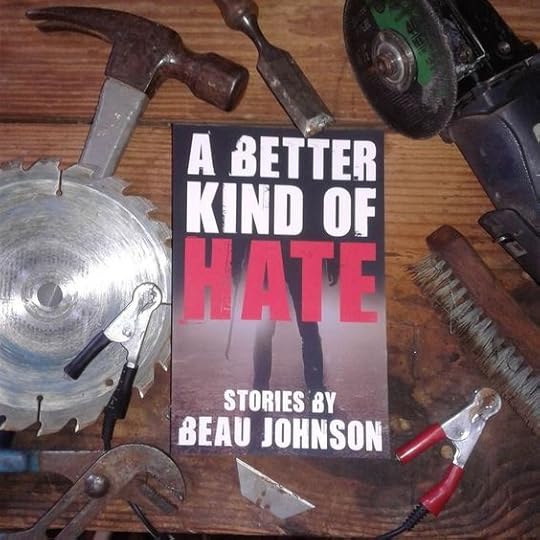
Most of these stories are very short—some only two or three pages—but their power lies in an inverse proportion to their word count. Do not misunderstand: they are not mindless gore or the novelization of an exploitation film (though if you like either get your favorite bookmark and dig in, because you'll like it too). No, these stories are often profoundly cerebral, walking a fine line between hardboiled noir and psychological horror. They are taut, mean, and not a single unnecessary word survived the editorial blade...and there are plenty of blades, and axes, and baseball bats, and cardboard compactors, and, well, you get the idea.
Johnson's stories give you what you don't get when your morally gray but unsatisfyingly anodyne television procedural fades to black. Beau's world is less Law & Order, and more True Detective (nihilistic monologues and all). And of course Beau's most interesting creation, Bishop Rider, starts to stretch his legs here in A Better Kind of Hate. And Bishop, well, he's kind of what Batman would be like if someone that psychologically damaged were real—equal parts boogeyman and angel of vengeance. So, if you like him, Bishop Rider goes on to rampage through several of Johnson's subsequent books, the newest being Old Man Rider, which at the time of this review is about to debut on October 24, 2022.
So if you enjoy seedy crime stories, tales of a town's darker underbelly, and the bleakness that comes when a city eats itself, I highly recommend you add this to your list.
Goodreads Blog & Reviews | Amazon | Twitter | Instagram | Pinterest | Linktree
Published on October 05, 2022 16:31
•
Tags:
book-review
September 28, 2022
Book Review: Mapping the Interior
 Mapping the Interior by Stephen Graham Jones
Mapping the Interior by Stephen Graham JonesMy rating: 5 of 5 stars
Mapping the Interior walks a line between quiet horror and magical realism, and I'm here for it. Some authors can play on your emotions with their stories, but Jones plays you like a Stradivarius with his taut prose. It's raw and sometimes feels like you're reading something you shouldn't, like peeking through entries from a stolen journal or listening in on someone else's confession.
There are a lot of layers, despite the POV character being a kid. It is a profound meditation on grief and loss, on running both away and toward becoming like one's own parents, on poverty, on family traditions and heritage, and on navigating cultural differences and otherness. Heavy stuff, but Jones handles it masterfully through the lens of childhood.
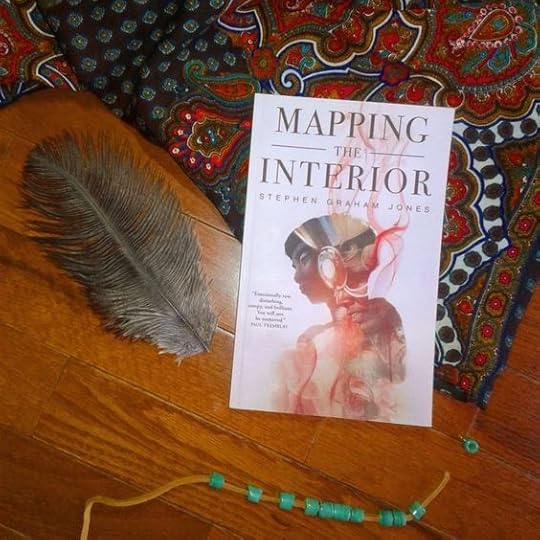
I confess the ending left me rattled. I wasn't (still am not) sure how to process the way Jones closed the circle of this ghost story. It's the sort of powerful conclusion that will stay with you long after you reach for the next book on your TBR list.
My Goodreads Reviews | Amazon | Twitter | Instagram | Pinterest | Linktree
Published on September 28, 2022 18:53
•
Tags:
book-review
June 6, 2022
Book Review: The Worm and His Kings
 The Worm and His Kings by Hailey Piper
The Worm and His Kings by Hailey PiperMy rating: 5 of 5 stars
Cosmic horror is definitely one of my favorite subgenres, but it is difficult for many stories to maintain the fine balance between acknowledging the rich history of the earlier foundational stories and doing something new we haven't seen before. I don't think I've read a story that strikes that balance as perfectly as Hailey Piper's The Worm and His Kings. She has invented a completely new mythology, and it feels both familiar and alien at the same time. Cults? Check. Ancient entities? Check. Monstrous alien god go-betweens? Check. But it's so much more, dealing with themes about love, loss, class, homelessness, justice, transformation, and betrayal. It's also an important addition to the canon of both queer and trans storytelling.
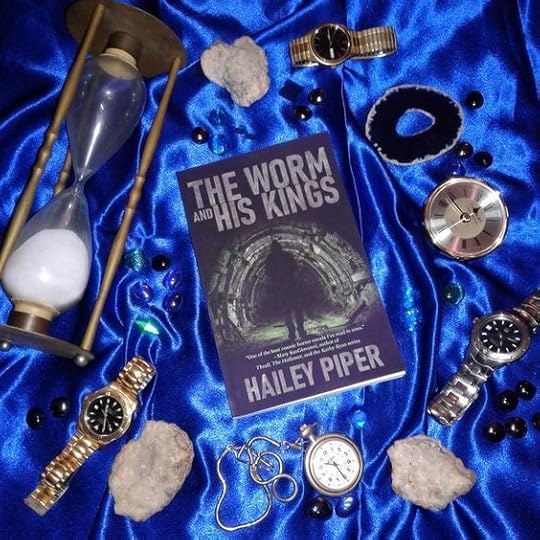
If you've ever read Clive Barker's first volume of Books of Blood, you will have encountered his short story "The Midnight Meat Train" (or, you might have seen the 2008 film, which is quite a good adaptation). Barker's story teased at a much deeper mythology of the things that live deep beneath the city, and the ways in which reverence for those things have wound their way into the mundane, sunlit world above. I'd always wished to get a better peek at the depth of that mythos, but Barker has never revisited that tale and it has left me with an itch I cannot scratch. Piper's The Worm and His Kings, while wildly different in theme, premise, and plot, managed to satisfy my curiosity about ancient secrets hidden in that sunless world beneath the city.
There is a bit of a learning curve with respect to both the myths and the science Piper lays out, and unlike more creature-feature cosmic horror, she does not shy away from playing with other science-fiction concepts like temporal mechanics, spacetime geometry, parallel realities, and causality. They are never overly technical, but she weaves them into her mythology in a way that provides a wholly satisfying and metaphysical conclusion.
If you enjoy cosmic horror broadly, or even dark, urban fantasy, this should definitely be added to your reading list.
My Goodreads Reviews | Amazon | Twitter | Instagram | Pinterest | Linktree
Published on June 06, 2022 18:34
•
Tags:
book-review
May 27, 2022
Book Review: The Atrocities
 The Atrocities by Jeremy C. Shipp
The Atrocities by Jeremy C. ShippMy rating: 5 of 5 stars
Shipp's The Atrocities is well-served by featuring the iconic maze on its cover. Like any self-respecting maze, The Atrocities is a lush story that is never quite what you think it's going to be. A haunted house? A respectable family? A terrible tragedy? Mental illness? Unquenchable grief? All the ingredients are there.
It's worth mentioning that there is a key difference between a labyrinth and a maze: labyrinths have a single path in and out, whereas mazes are full of right and wrong choices. Shipp manages to give us both. Our path into the book may be a labyrinth for us, but Shipp shows us that readers have choices on how to interpret a character's journey.
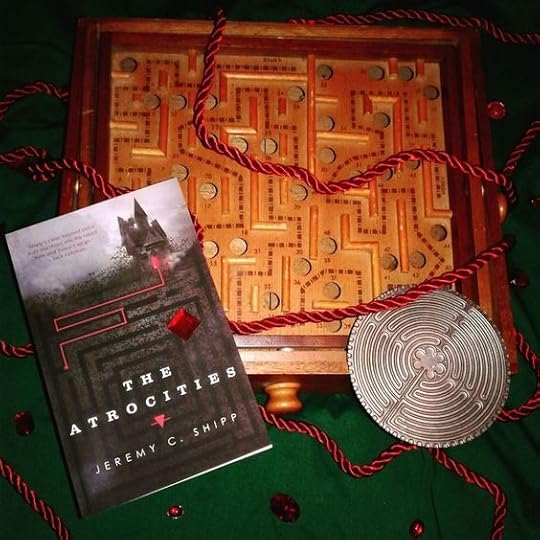
You get comfortable with the direction of the narrative, and then we are reminded the story is a maze, full of questionable motivations, unreliable narration, darkly fantastic nightmares, and stories within stories. It's no accident that the house is encircled by the maze, as the story itself both ends and begins there. It is symmetry that both are full of dead ends, false starts, and hidden secrets. But it is not a minotaur you find at its center. Instead it's a chimera of heartache and betrayal, slowly revealed by Shipp's inexorable dream logic.
It is difficult to discuss the plot beyond the book's synopsis without spoiling the tricks of the maze, but the tale is glorious Gothic goodness from beginning to end. Many have pointed out the story ends abruptly. I think that's probably a fair assessment, but then again, emerging from any maze is usually disorienting, revelatory, and sudden.
If you're in the market for a modern Gothic ghost story with a dose of labyrinthine delirium, The Atrocities should be added to your list.
My Goodreads Reviews | Amazon | Twitter | Instagram | Pinterest | Linktree
Published on May 27, 2022 20:01
•
Tags:
book-review
May 12, 2022
Book Review: The Fiends in the Furrows: An Anthology of Folk Horror
 The Fiends in the Furrows: An Anthology of Folk Horror by David T. Neal
The Fiends in the Furrows: An Anthology of Folk Horror by David T. NealMy rating: 5 of 5 stars
Folk Horror is a favorite subgenre of mine, and I wasn't disappointed by this first volume in Nosetouch Press's anthology series. Anthologies are tough, and there is almost always a range of opinions about which stories land and which might not for any given reader. However, there is a lot to love in each of these stories. My three favorites include "Sire of the Hatchet," "The First Order of Whaleyville's Divine Basilisk Handlers," and "The Fruit".
"Sire of the Hatchet" by Coy Hall
This story really sets the table for the whole anthology. Hall's prose is exceptional, the characters are fully drawn (which is no small task in short stories), and the classic Folk Horror mood has the requisite contrast between the mysterious and the threatening. Witchcraft, executioners, Puritanical ideologues, and something old stirring in the forests on the outskirts of town. One of the best in the anthology.
"Back Along the Old Tracks" by Sam Hicks
This is one is very well written and one of two stories that follows the core motif of a metropolitan visitor getting a peek behind the rural curtain. There are also echoes of Lovecraft here in two ways. First, the outsider runs afoul of a family whose consanguinity and cursed condition has made them feared throughout the village. And second, Hicks hints, teases, implies, and suggests much, and allows our imagination to expand into the spaces he doesn't fill explicitly.
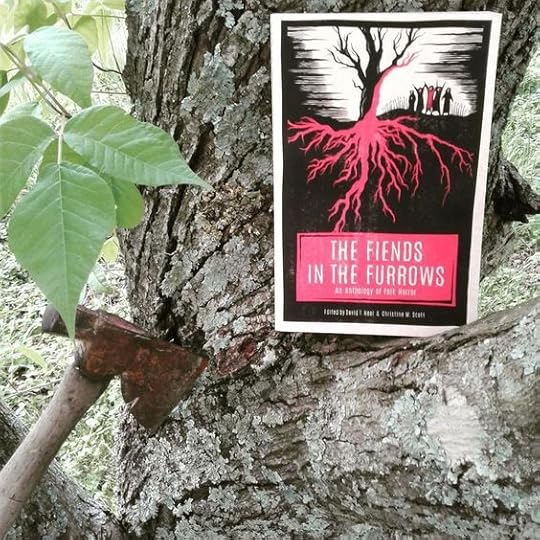
"The Fruit" by Lindsay King-Miller
This one is eerie, seductive, and dangerous. The world building is both lush and menacing. King-Miller's mastery of language and "voicey" narration makes it my favorite story in the whole anthology. I could go on and on about this one, but it really is a perfect slice of Folk Horror.
"The Jaws of Ouroboros" by Steve Toase
Initially I had mixed feelings about this story. Compared to the others, it is not straightforward Folk Horror, but operates more as a gritty noir story. However, I think it might represent a completely new subgenre, almost a postmodern Folk Horror. Traditionally, much of Folk Horror deals with the modern world's intrusion into the rural spaces where old ways clash with modernity. This one turns that on its head, and instead it is as if the story begins sometime after the rural elements have played out and the pastoral darkness has begun leaking out into the wider world. As a result, the insatiable hunger of ancient standing stones has provided a lucrative commodity for the criminal underworld, which is all too happy to sell the horrors of the countryside to city folk for the right price.
"The First Order of Whaleyville's Divine Basilisk Handlers" by Eric J. Guignard
I live in a state that does still have a few churches where snake handling is practiced, though technically illegal, so this story was a hoot. While there was a lot of rather morbid events, the story is probably one of two in the anthology that could maybe be considered joyful, probably because of the youth of the protagonist. It's wonderfully written, and other than "Back Along the Old Tracks" is the only one that really delves into the sense of community that small, rustic towns often have. Barn dances, get togethers, neighbors-as-family...but also town rivalries, gossips, religious hypocrites, and neighborly jealousies. This one was one of my favorites.
"Pumpkin, Dear" by Romey Petite
While the plot is straightforward, there's a lot going on in this story. There's an ebb and flow between when the narration is true and when it's unreliable. Adultery (maybe), mental illness (maybe), possession (maybe), body horror, homunculi alchemy, murder, resurrection, reincarnation, misogyny, feminism, prudishness, sexual liberation...yeah, lots going on. On the one hand, it has a dream-like, fairy tale quality; and on the other, there's a more modern and voyeuristic element where we watch the slow disintegration of a marriage. Of the list, this one feels like it has the most to offer if re-read a few times.
"The Way of the Mother" by Stephanie Ellis
This story made me mad. I mean that as a compliment. Occasionally good stories do that. I personally hate it when Puritanical busybodies have a measure of authority, and that plays out in force here. It features a closed society that has walled itself off from the modern world, and requires its residents to remain perpetually stuck in a different era or suffer deadly consequences. The absolutist, authoritarian qualities of the antagonist (who, admittingly, others might not consider an antagonist) really hit all of my buttons. I absolutely despised him. I literally stopped reading this anthology for a few days after this story because I hated him so much. It takes a lot of talent as an author to make a character evoke that much emotion. The writing is truly wonderful, and the imagery is maybe the best in the anthology.
"Leave the Night" by Zachary Von Houser
This is the second of two stories that follow an outsider visiting the countryside. I had recently read "The Legend of Sleepy Hollow" for the first time, and this story's first half reminded me of Irving's tale. Von Houser (or his protagonist) had a love for or keen eye for nature. The descriptions of the landscapes were beautifully written. It would be difficult not to cite The Wicker Man here, as it felt like this story was playing with similar thematic pieces. My only complaint was about an imagery shift that occurs. A lot of work goes into establishing a bird-like mythology throughout the first 95% of the story, but at the last possible moment the imagery switches to a totally different set of animal symbols. It feels like there's a reason for it, but not knowing it created a lack of resolution for me.
"Revival" by S.T. Gibson
Much like "The First Order of Whaleyville's Divine Basilisk Handlers", this story has snake handling, a young protagonist, and a generally joyful disposition. "Young" is probably an understatement, as this is the only story where the main character is a child, and she's one of the best characters in the anthology. There's some really interesting internecine religious imagery here, juxtaposing rural, Pentecostal-style beliefs with traditional Catholic theology. That collision is often messy in real life, and has created a delicate fault line in the girl's family. There's revenge, religious ecstasy, and family dysfunction. It's a great send off for this volume.
Folk Horror is experiencing a boom right now, and this anthology is a great addition to the subgenre. I highly recommend it.
My Goodreads Reviews | Amazon | Twitter | Instagram | Pinterest | Linktree
Published on May 12, 2022 17:47
•
Tags:
book-review
March 2, 2022
Book Review: The Run Fantastic by Luke Kondor
 The Run Fantastic by Luke Kondor
The Run Fantastic by Luke KondorMy rating: 5 of 5 stars
Until The Run Fantastic, I had never read Bizarro Fiction. I'm not sure why that is, as I've seen several films (some based on books) that I think probably qualify and have enjoyed them all. Things like John Dies at the End, The Adventures of Buckaroo Banzai Across the 8th Dimension, most of Terry Gilliam's oeuvre, and maybe even Big Trouble in Little China. I think I expected its literary twin to feel more like a Troma film and less like Donnie Darko. Luke Kondor has evangelized me, and after reading his tale of Ampersand Jones I am now a convert to the wiles of Bizarro.
The Run Fantastic does in a relatively short book what I rarely get anymore: I felt something. I read plenty of horror, science fiction, and fantasy, and I get a somewhat regular doses of mild fear, wonderment, and awe. Perhaps I'm desensitized, but I rarely read a book that takes me on a whirlwind tour of wicked humor, scalpel-sharp human commentary, love and loss, failure, insurmountable expectations, hopefulness, and at times a profound and moving melancholy. That last bit in particular hit pretty hard.
There's gore, but it isn't gruesome. Instead, Kondor is showing you up close the impermanence of our organic humanity, and what happens when life stops running. The imagery of Ampersand's story felt like something far more mythic. Each character or obstacle he encounters resonate with metaphors, as if you took The Divine Comedy and the Odyssey, put them into a blender, and topped the whole dish with an extra helping of The Wizard of Oz. And then, when you weren't looking, Luke slipped in a dose of that creepy as hell Return to Oz (1985) sequel that gave ten year old me nightmares.
It's been a while since I was as invested in the fate of a character as I was in those last ten pages of Ampersand Jones's marathon. It lays bare the profound pains anyone feels who is navigating those liminal spaces in their lives: entering adulthood, quarter-life/midlife/late-life crises, grief, death, and whatever might come after. Luke has a lot to say about the lengths we'll go to avoid those things, all the while trying to convince ourselves we're running toward our problems instead of away from them. I don't want to spoil it, but damn Luke stuck the landing.
So grab a copy, make sure you're well stocked on bananas, put the Blue Öyster Cult's "Don't Fear the Reaper" on loop, and enjoy yourself a really good book. And if you hear someone whistling behind you, don't worry. That's just the man with too many names. And while it's true that he's a slow runner, he always wins the race.
View all my reviews
Published on March 02, 2022 19:14
•
Tags:
book-review



